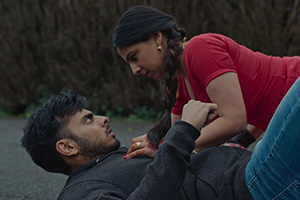How we made the film
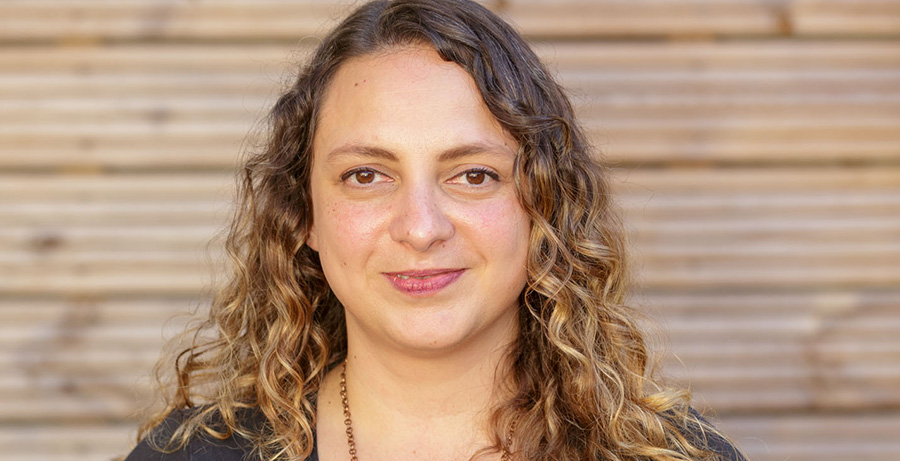
Producer Dominique Unsworth MBE
Our debut romantic comedy feature Little English hits cinema screens on Friday, and all of us at Resource Productions have been reflecting on the mammoth journey it took to make the film back in the summer of 2021. To even get to that point, like any indie film, was a mini miracle.
I first set up Resource Productions in 1999. We are a not-for-profit social enterprise based in Slough (the most diverse borough in the UK), supporting creatives to develop work and get their first commissions and jobs in the creative industries. Over the past couple of decades we've supported thousands of young people and adults to develop creative projects, with many moving on to great success.
It was when I set up Resource that I first met Pravesh [Kumar, director] at his theatre company RIFCO. Little English was a stage play back then and it was always a shared ambition to try to turn it into a film, but getting it funded was another mission in itself. We continued working in our parallel fields with an eye on this project until, weirdly enough, the pandemic allowed us to align some key factors.
People were struggling to make ends meet and local young people were unemployed and isolated, so we devised the project 'Kickstart into Film' and approached the Rothschild Foundation to provide us with the funds to employ out of work and underrepresented talent to work on a project that would give them their first feature credit. Their support gave us just enough to get the ball rolling but we were still aiming well beyond our means.
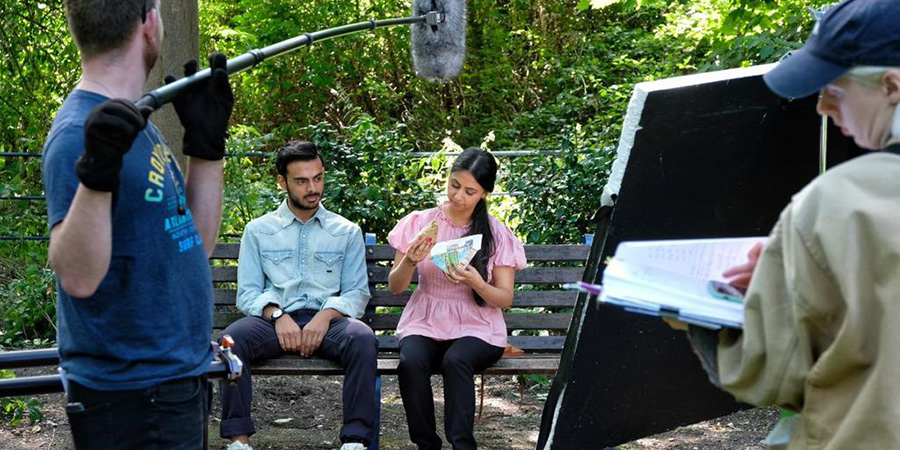
Over the past two decades Resource Productions had built some strong contacts and support through our work and with our first feature on the horizon, everyone rallied around us. We secured additional amazing support from Berkshire based indie kit company ZXRecords, who executive produced the film, as well as lots of help from MBSE UK, VMI, Digital Orchard, Salamandra Animation Studio, Berkshire Film Office and Pinewood Studios.
While we were in pre-production it was a juggle as we had some partners and support confirmed and others not quite yet. Working out how we were going to make the film and work with the support on offer whilst prioritising the cast and crew's needs was the biggest challenge.
The first thing on the list was to bring in script editor Adeela Sharif-Antunes. Adeela and Pravesh sat down and worked on the script together. In the stage play there is a lot more freedom for the audience to imagine what they were seeing. For a film like this, we couldn't ask the audience to do that. The goal was to make the script achievable on a budget, without losing character, story, comedy and the culture elements that are woven into the heart of the story.
While the script was being developed the next step for me was to find some producing support. Producing is tricky as you have to manage very different issues at any one time, practical problems, creative story issues whilst juggling financial and legal management. We reviewed all the producers on our talent database and discovered that Lesley Anne Macfarlane had formerly worked with Pravesh at RIFCO, whilst Andrew St Maur was one of the first young people I ever taught at Resource Productions' youth film club, who went on to secure a Pinewood Studios scholarship to attend the NFTS.
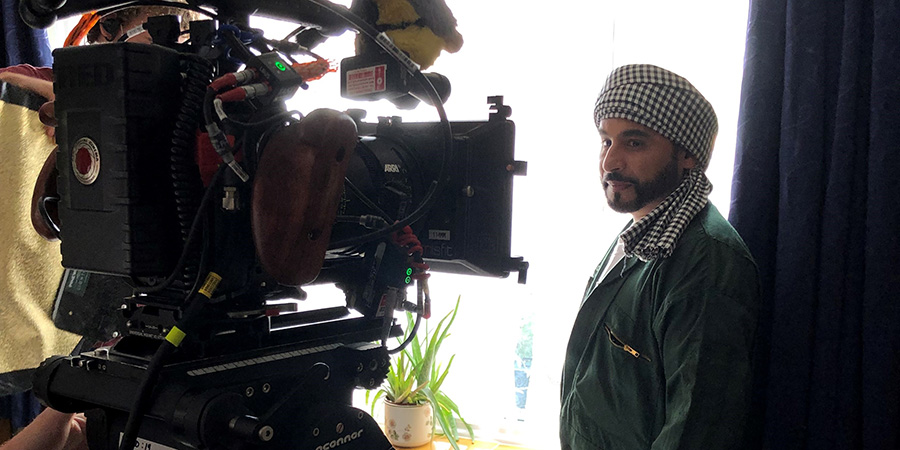
Once this team was formed and the script was in a good place we divided up various tasks, casting, crewing, locations and financing. It was at this point I turned to my 12-person strong staff team for support, again something we had spent twenty years building!
Our head of production, Amanda Dorsett, who had led on many of our commissioned broadcast shorts for BBC and Channel 4, as well as more corporate projects, took on the role of production manager, whilst Terry Adlam, our head of training, was selected as 2nd AD. Lilly Hudson who runs the Berkshire Film Office stepped in as our location manager, Siobhan White turned her experience to production coordination (and acting). Anthony Crockett joined the camera team and Abhi Arumbakkam supported our new intake of young people on the 'Kickstart into Film' programme, completing our core crew.
Once the film was complete we managed to secure a festival premiere with the London Indian Film Festival in June 2022 and later in the year we went to Seattle and won the audience award at the Tansveer South Asian film Festival. Now, thanks to national lottery funding from the BFI Audience Fund, we're able to go on tour to do screenings and Q&As with some of our cast and crew, targeting areas with large South Asian communities. We start with our home town of Slough, where the film is set, on 16th March, with tickets now available.
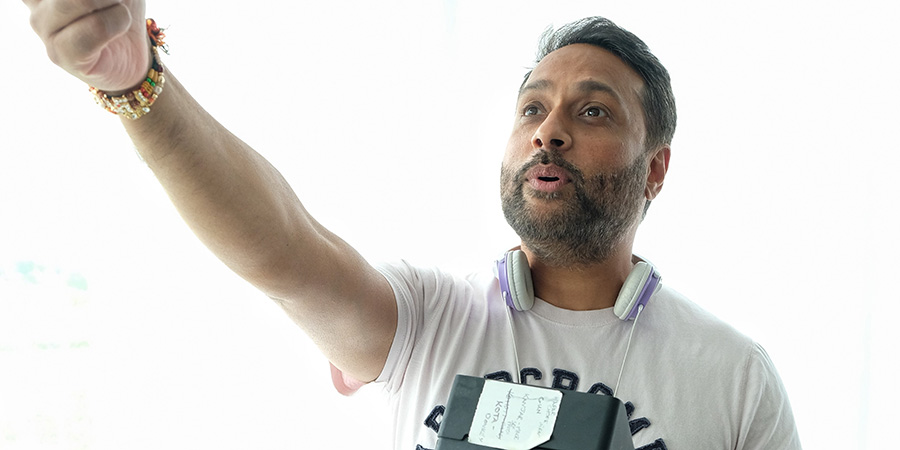
Writer / Director Pravesh Kumar MBE
This didn't feel real until we had assembled the incredible cast for this wonderful film; the process of casting in lockdown was full of challenges but ultimately joyous. I've learnt so much over the years in terms of actors, performance and the audience especially when it comes to comedy. I'm lucky that theatre gave me such a solid foundation to really develop the story and character journeys and I can always hear the audience. Both actresses that have played Simmy, the lead in both versions, Vineeta Rishi in the play and Rameet Rauli in the film, really immersed themselves in the part and I feel blessed to have such talent to work with.
Viraj Juneja, a fresh comedic talent and a strong actor, took his character Harry full-on and really dedicated himself to the part. We needed someone as a strong despairing matriarch who slowly warms as we move through the film and Seema Bowri did an outstanding job as Gurbaksh. I don't think anyone else could have played Simmy's new in-laws, Mindy and Bobby, in the film other than Goldy Notay and Ameet Chana. Safe to say I had written the roles for them, knowing their chemistry and comic genius. Living legend Madhav Sharma plays our diabetic, sugar-crazed Bauji. Laugh out loud Nikki Patel slayed as Sweetie and I know she will be an audience favourite. With all these amazing actors, now all friends, I felt so excited to start exploring on set with them to find some gems of comedy and heartfelt performances.
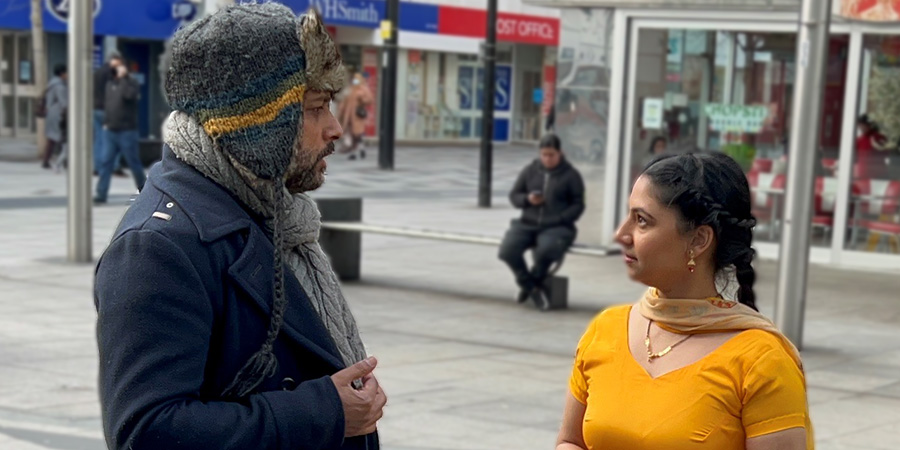
Making a micro-budget film means you are constantly making compromises. Often these hurt but sometimes push you to make good creative choices too. I'm grateful for such an incredible creative partner in Leigh Alner as director of photography. Leigh did a great job in helping me figure out the visual storytelling and how we can bring some charm and some magic to all the scenes. The shooting process itself was a tough one as we were still working with covid measures so had to keep testing and wearing masks to make sure everyone was safe. Time was the big pressure so planning as much as possible was very important: having time to block out the scene and find the emotion, and being careful not to over play the comedy but let it just sizzle at the right points. We knew we wanted to keep the first half the film claustrophobic and darkly lit, so that we could explore a change with colour and energy in the second half of the film.
I managed to convince my brother, Andy Kumar, to not only play a part in the film but also design the production and costume for me. We have worked together for years and have a short cut and he did a great job. The house in the script undergoes a change, just like a character in the film, so we had to plan properly when we shot scenes as once things changed, they changed for good. Planning that all out was a team effort and what we managed to do works really well for the film. Likewise, all the cast transformed into their characters each day thanks to Shailini Parmar and her make up team.
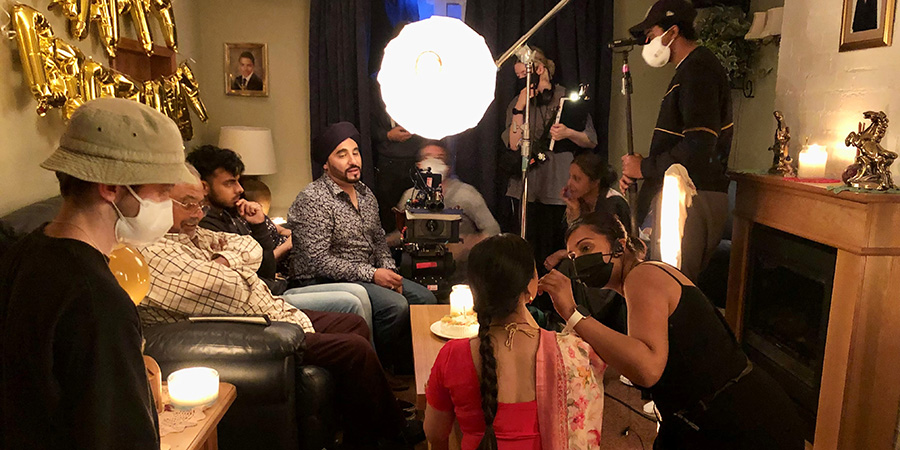
Once we had all recovered from the long 6-week shoot (yes, we managed to squeeze out 6 weeks) I sat down with the post-production team of Kam Parmar (editor), Philip Moroz (sound editor and mixer), and Niraj Chag (music composer), to start to piece the film together carefully. Crafting the story was the first crucial stepping stone and finding the comedic tone balanced with the drama was crucial. Kam and I spent several months on it before Philip and Niraj could get going with sound and score. They both added a beautiful layer of clarity and emotion to building on some of the great performances and elevating the visuals. Kam and I even recut a couple of the scenes after hearing Niraj's moving score.
I know there is an underserved audience for this film and I hope they enjoy seeing themselves authentically represented on screen.
Little English is available now on digital platforms
Help us publish more great content by becoming a BCG Supporter. You'll be backing our mission to champion, celebrate and promote British comedy in all its forms: past, present and future.
We understand times are tough, but if you believe in the power of laughter we'd be honoured to have you join us. Advertising doesn't cover our costs, so every single donation matters and is put to good use. Thank you.
Love comedy? Find out more
